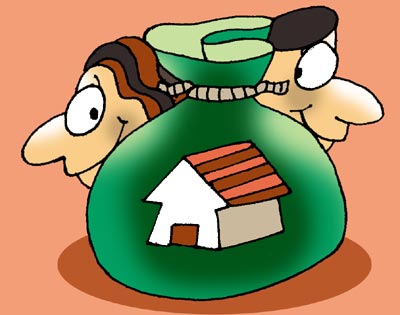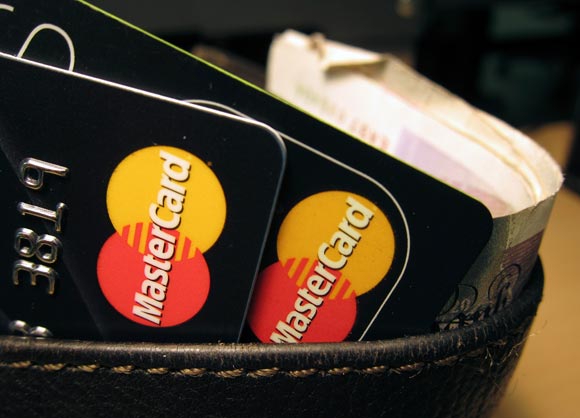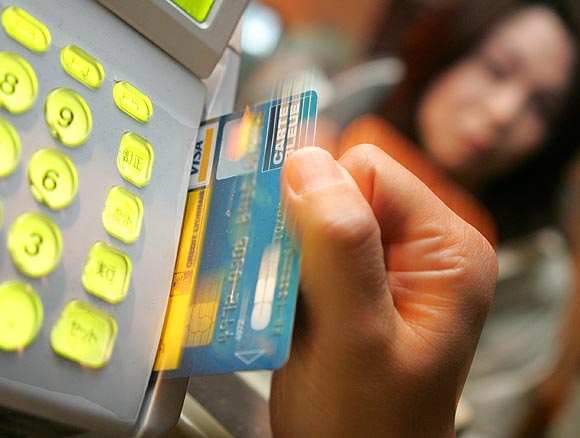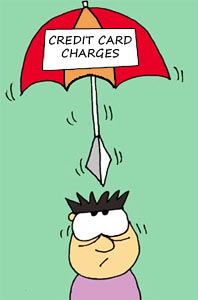Photographs: Uttam Ghosh/Rediff.com Rajiv Raj
Wondering what's the connection? Here goes...
Financial institutions check your CIBIL credit score before extending you a loan. Your credit card usage and payment history sharply affects your credit score. With some simple precautions you can avoid a negative impact on your CIBIL credit score and enjoy better rates on your mortgage.
You may wonder about the connection between your credit card and a home loan besides the fact that both are credit issued by a bank/financial institution. The credit card is the most common denominator with most people in their banking and credit history. Its incorrect usage can bring down your CIBIL credit score sharply and could even prevent you from getting a home loan or you may get the loan on very unattractive terms.
For instance, in the case of Abhinav and Amit, two brothers who borrowed Rs 50 lakh each for a period of 20 years, Abhinav got his loan at 10.25 per cent per annum due to his excellent credit history and high CIBIL credit score.
Amit on the other hand got the loan at 12 per cent per annum since he has a considerably lower CIBIL credit score. The total difference in interest paid was over Rs 8 lakh over the 20-year tenure. Here is how your credit card can prevent you from getting a mortgage.
The author is a credit expert with 10 years of experience in personal finance and consumer banking industry and another 7 years in credit bureau sector. Rajiv was instrumental in setting up India's first credit bureau, Credit Information Bureau (India) Limited (CIBIL). He has also worked with Citibank, Canara Bank, HDFC Bank, IDBI Bank and Experian in various capacities.
How your credit card can ruin your chances of buying a home
Rajiv Raj
1. Too many credit cards
If your wallet is a hue of multi-coloured credit cards, then it is a clear indication towards your hunger for credit. While it may sound fun to have a wallet full of credit cards, multiple credit applications can be highly detrimental to your credit score as it is seen as "credit hungry" behaviour. Credit hungry behaviour brings down your CIBIL credit score and lessens your chance for securing a mortgage loan.
How your credit card can ruin your chances of buying a home
Photographs: Jonathan Bainbridge/Reuters Rajiv Raj
2. Frequent balance carry-overs
Credit card companies make it all too easy to pay a minimum balance and carry over the balance amount to the next month. Carrying over a credit balance means that one end up extremely high interest rates and losing a free credit period. The hidden effects of balance carry-overs are worse.
These balance carry-overs weigh heavily on your CIBIL credit score as your credit outstanding increases and the inevitable defaults would mean a credit report that no lender would like to touch. Hence, balance carry-overs can prevent you from acquiring a home loan.
How your credit card can ruin your chances of buying a home
Photographs: Issei Kato/Reuters Rajiv Raj
3. High credit utilisation
A high proportion of credit usage is also considered a negative for credit score. For instance, if you have a credit of Rs 3 lakh allotted to you across all your credit cards and other debts and your usage is very high say Rs 2 lakh and more, then the rating agency will start scoring you negatively.
Ideally around 30 per cent of the total credit limit should be utilised at any point of time.
At the same time if you do not use your credit cards at all and are not building up a credit and payment history, this will also work against you. So the ideal solution is to use the card but in moderation to be able to get a home loan at great interest rates.
How your credit card can ruin your chances of buying a home
Photographs: Uttam Ghosh/Rediff.com Rajiv Raj
4. Credit portfolio leaning towards unsecured loans
An ideal credit portfolio should be a balance of both secured and unsecured loans. If you are holding only unsecured debt such as credit cards, personal loans etc then your credit score will see a downward spiral.
Hence a good balance in debt is a better choice than only unsecured debt and will better your chance of home loan approval.
How your credit card can ruin your chances of buying a home
Photographs: Dominic Xavier/Rediff.com Rajiv Raj
5. Past unresolved discrepancies
Often there are disputes and discrepancies in your credit statement or you may be in disagreement about some charge the bank has charged in the past. If these disputes have remained unresolved then you may have refused to make the payment then it continues to show as outstanding in your account.
The bank's software automatically classifies this as a defaulting amount and there pops up a red mark in your credit report. It is best to resolve discrepancies so that it does not harm your credit health and prevent you from acquiring your dream home.








Comment
article